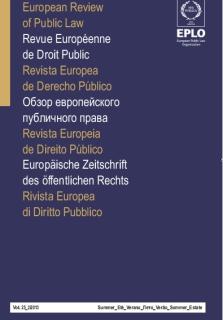
Constitutional Law / Droit constitutionnel
2012
THE NETHERLANDS / PAYS-BAS
REMCO NEHMELMAN
Associate Professor of Constitutional Law at the Utrecht University, The Netherlands
The main constitutional issue in 2012 in the Netherlands were the call for new elections for the Second Chamber (the directly elected Chamber of Dutch Parliament). More in particular, the new procedure for the formation of Government was important. The role of the Dutch Head of State was firmly diminished. The Second Chamber itself took for the first time control in this procedure of forming a Cabinet. Furthermore, an important act on transparency of political party funding was introduced in Dutch legislation. The Netherlands was one of the last countries who had not any regulations concerning the transparency of political party funding. The lawsuit of Geert Wilders of the Party for Liberty against the Dutch State was not successful. The District Court of the Hague stated that it was not his constitutional role to intervene in the relations between Dutch Parliament and Government. Two court cases were very important with regard to human rights. Firstly, the District Court of Assen banned the Association "Martijn" which promoted paedophilia. Secondly, the long-lasting cases concerning the Dutch fundamentalistic Christian political Party of the SGP came to an end in Strasbourg. The European Court of Human Rights stated that the complaint of the SGP was manifestly ill-founded meaning that women in the Netherlands from now on can stand for election in all representative institutions such as municipality councils or the national parliament.
La principale question constitutionnelle qui s'est posée en 2012 aux Pays-Bas a été la convocation à de nouvelles élections pour la Seconde Chambre (Chambre du Parlement néerlandais élue au suffrage direct). Plus particulièrement, la nouvelle procédure de formation du gouvernement a été importante. Le rôle du chef de l'Etat néerlandais a été nettement diminué. La Seconde Chambre a pris elle-même pour la première fois le contrôle dans cette procédure de formation d'un cabinet. En outre, une loi importante sur la transparence du financement des partis politiques a été introduite dans la législation néerlandaise. Les Pays-Bas étaient l'un des derniers pays à ne pas avoir de réglementation en ce domaine. L'action en justice de Geert Wilders, du Parti de la Liberté, contre l'Etat néerlandais a échoué. Le District Court de La Haye a statué qu'il ne relevait pas de son rôle constitutionnel d'intervenir dans les relations entre le Parlement néerlandais et le gouvernement. Il y a eu deux affaires importantes en matière de droits de l'homme. Premièrement, le District Court d'Assen a interdit l'Association "Martijn", qui promouvait la pédophilie. En second lieu, les procédures ouvertes de longue date concernant le parti politique chrétien fondamentaliste néerlandais du SGP ont été closes à Strasbourg. La Cour européenne des droits de l'homme a jugé que la plainte du SGP était manifestement dénuée de fondement et que dorénavant les femmes aux Pays-Bas pouvaient se présenter aux élections pour toutes les institutions représentatives, telles que les conseils municipaux ou le Parlement national.





















